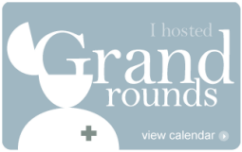Guest author: Shamsha Damani (@shamsha) ;
Submission for the April Medlib’s Round
Let’s face it: Facebook is pretty popular these days. Everyone and their grandmother (literally!) is on Facebook. In fact, if you don’t have a Facebook account, you are considered a social pariah. As I pondered over my next guest blog post on Jacqueline’s blog (thanks Jacqueline!), I started thinking that evidence based medicine (EBM) has a lot in common with Facebook. EBM, like Facebook, is very popular, everyone “claims” to be using it, and god help you if you shun it.
However, in my day-to-day work as a Clinical Librarian, I find that many healthcare providers really don’t know how to practice EBM. EBM surely gets a lot of press but many healthcare providers fail to explore it in depth. This can be due to lack of time, lack of resources, or not really knowing where to start. And you know what, it is okay to feel overwhelmed because EBM can be overwhelming. But looking at the big picture helps. Consider Facebook for a moment again: many people get overwhelmed by the applications, the groups, the wall, and forget the big picture: Facebook is about connecting with your friends and family. Similarly, think about the big picture of EBM: it is about using good evidence to treat your patient (defining good evidence however, can be a blog post of its own!).
Keep the basic principles of EBM in mind: Ask a focused question, find the evidence, critique the studies found, and then make a decision. Some people get overwhelmed by the evidence and allow it to usurp their own clinical judgment. Yes, EBM is about evidence, but it is also about using that evidence in conjunction with your clinical judgment. Don’t let the evidence hijack your clinical expertise. And lastly, don’t forget your patient. You can have the best evidence in hand with sound clinical judgment; but if your patient’s wishes differ from your evidence, then you have to respect them and let go of the evidence.
Many people think that EBM, like Facebook, is a fad and will be replaced by something else. They may be right. However, until something better comes along, I think that healthcare professionals should get back to the basics of EBM, see the big picture, and put in the extra time it takes to practice EBM correctly. An appointment with your medical librarian wouldn’t hurt either! Evidence keeps changing (kind of like Facebook!) and it takes hard work to keep up; but the results are totally worth it!
Shamsha Damani













Fascinating analogy
I think the other couple of things you need to be mindful of is the quality of the evidence and the fact that so much of what we do has no solid evidence to support it – in other words we’re as wiser as the patients…in fact, a lot of the time, the patients are wiser than us.
Great statement about using EBM “in conjunction with your clinical judgment”. One should not take precedence over the other. Also, I’d never thought of EBM in relation to Facebook but I can see the similarities. Many people know what EBM is in general but they don’t take the time to learn all of its possible applications.
[…] Guest Post of Shamsha Damani: Evidence based medicine the facebook of medicine. (2009/04/04) […]
[…] her guest blog on Laika’s Medliblog, Shamsha Damani, a clinical librarian based in Texas, outlines the […]
Shamsa,
Nice post about EBM, which is a topic that seems to generate controversy among more experienced clinicians. At my library, those doctors with 20 years experience – meaning those who have already seen 200 patients with XYZ syndrome, and treated them successfully – do not tend towards using the Cochrane Library… although they could be the ones writing the reviews!
As a medical librarian, what I’ve seen is that during medical students’ third year, when they’re out in the wards seeing many different types of patients (and diseases) during their clerkship rotations – and may have little knowledge of current therapies on how to treat a disease they have little experience with – then introducing library sources such as the Cochrane systematic reviews or APC Journal Club, Best Evidence, or trying a search using the TRIP database, represents the “teachable moment” for them. That’s when they decide if they want to look at “expert” opinions, or continue to search the primary literature themselves to find original trials, etc. to answer their PICO question. I have also shown them the available standardized EBM filters in PubMed; many of the students save them in their NCBI account for later use. It is a challenging task to encourage the practice of EBM but this generation (IMHO) are the ones we can reach.
Creaky
Thanks to all for the great comments. As other medical librarians would attest, it makes it difficult to search for good evidence when the term EBM is used loosely just to get attention.
Great post – I definitely agree. As a clinician myself, I agree that EBM is drastically underutilized and under taught in medical schools. I have had the rare opportunity to immerse myself in an EBM focused education and believe that using tools of EBM we can elimite so much inefficiency in the practice of medicine and help to automate processes that often cause clinicians so much trouble/paperwork involving common chronic care and preventive medicine decisions.
Again, great post… keep up the advocacy, unlike facebook, EBM is not as popularly used or as easy to understand – YET.
[…] a prominent twitterer and has written quest posts at this blog on several occasions (here, here, here and […]